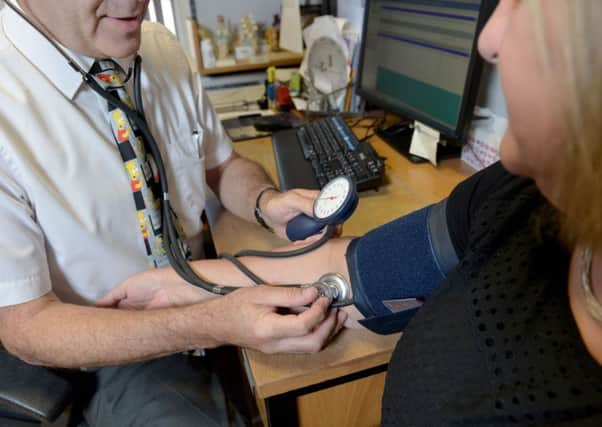Paris Gourtsoyannis: Migrant pressure based on a myth


It’s a well-observed phenomenon in sport that teams under pressure tend to perform better away from home. Relieved of the barracking from their own terraces, they play with a freedom and expression that they don’t dare when stifled by the expectation of a home audience.
No word on which football team he supports, but maybe that’s what came over Philip Hammond when he spoke to German newspaper Welt am Sonntag over the weekend.
Advertisement
Hide AdAdvertisement
Hide AdThe account he gave to foreign journalists was more candid than anything to have emerged from Theresa May’s fiercely buttoned-up cabinet. It was a particularly free-wheeling display from the man dubbed ‘spreadsheet Phil’.
After six months of Number 10 hiding in a fog of its own bland platitudes, the Chancellor not only showed the government’s Brexit negotiating hand. He did so in plain language that delivered a clear political message - and issued a blunt threat to EU leaders in the process.
He repeated the government’s insistence that the UK will impose border controls to cut immigration - a statement that spells an exit from the European internal market to any Brussels bureaucrat.
But, Hammond added, if you don’t give us favourable terms so UK companies can sell back into that same market, he would cut corporation tax and hack away at business regulation, reshaping the UK as a buccaneering low-tax economy off the shores of Europe, ready to mount a pirate raid on its former EU partners.
The UK was “a recognisably European-style economy with European-style taxation systems, European-style regulation systems… But if we are forced to be something different, then we will have to become something different,” he said.
The implications at home are clear: lower tax revenues mean less public investment, and scrapping the European social model means as yet unheard of reforms to public services.
In short, a political prospectus that was little in evidence in the 2015 Conservative manifesto, and nowhere to be seen on the EU referendum ballot paper.
If that sounds startling, even more surprising in Hammond’s interview was his other admission: there was no need for any of the bother. “We are aware that the message from the referendum is that we must control our immigration policy,” he said. “We have over three million European migrants working in our economy and we have full employment. So clearly we need people to come and work in our economy to keep it functioning.”
Advertisement
Hide AdAdvertisement
Hide AdBut, he added: “We must have overall control.” There is, the Chancellor said, no immigration crisis - merely an instruction born out of a political crisis.
It may be half a year too late, but as Britain contemplates the kind of country it is going to become, it’s difficult not to consider what might happen if political leaders sought to shape opinion on immigration, rather than follow it. Brexit aside, they may still need to try.
A Survation poll this week asked the public what they thought was the biggest factor contributing to the crisis in the NHS being felt in all parts of the UK.
The most popular choice was immigration, cited by 28 per cent of respondents. It just edged out government funding for health, and was picked by twice as many people as an ageing population - a source of genuine danger to the NHS as the baby boomer bulge starts to hit retirement and places an even greater demand on health and social care services.
The reality is that you are far more likely to be treated by an immigrant than miss out on a hospital bed because of one. Indeed, the NHS is reliant on staff born outside the UK.
Over a quarter of all NHS doctors are believed to be from outside the UK, more than twice the proportion of the overall population made up of immigrants. Roughly five per cent of NHS staff are from EU countries, here thanks to free movement rules the Prime Minister will today confirm the UK is abandoning.
Research by the King’s Fund think tank in 2015 confirmed that rather than putting a disproportionate strain on the NHS, immigrants are actually less likely to require treatment because they tend be of younger, working age and therefore healthier. The UK government’s own estimates suggest providing health care to immigrants and visitors costs £2bn a year - less than two per cent of the £116bn health budget in England.
There is one group of EU migrants that do put a disproportionate strain on the NHS - elderly pensioners. 145,000 retired Brits are registered with health services in other EEA countries, compared with just 4,000 European nationals retired in the UK, according to figures released last week.
Advertisement
Hide AdAdvertisement
Hide AdIn 2014-15, the UK paid a total of £674.4m for citizens living elsewhere in Europe to receive public health treatment, compared to just £49.7m collected from other EEA countries - a deficit of over half a billion. In comparison, genuine health tourism, where foreigners receive free treatment in the UK they would not normally be entitled to, costs just £80-90m.
In the face of overwhelming evidence, it is a political failure that over a quarter of the British public believe that immigration not only puts a strain on the NHS, but is the single biggest cause of its problems.
The consequences of that failure aren’t just felt by foreign nationals living and working in the UK, nor just by the NHS which relies on their labour. It denies everyone, including the people who hold such obviously mistaken views, the debate the country needs about the future of the NHS - or housing, employment and education.
There are few countries that can claim to have a healthy approach to immigration, and it’s unlikely any of them are located in Europe. But even as the UK heads towards Brexit, it is worth asking where mistaken beliefs about immigration will lead next.